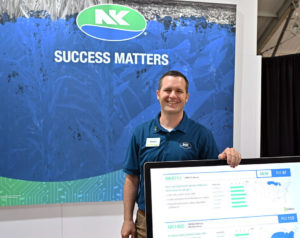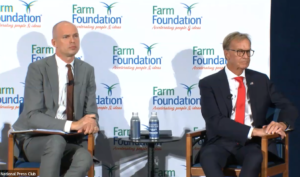Farm Foundation Hosts Farm Policy Forum
Moderated by Kristina Peterson with The Wall Street Journal, The Agricultural Platforms of the Candidates for President of the United States featured Kip Tom, Farmers and Ranchers for Trump Coalition, for the Republican platform, while the Democratic platform was advocated for by Rod Snyder, former Senior Advisor for Agriculture for EPA in the Biden-Harris Administration. Topics covered included the farm bill, agricultural trade, environmental policy, farm labor and immigration, and biofuels policy.
Snyder, who recently stepped down from his position with EPA, outlined the accomplishments of the Biden-Harris administration in the area of rural development, and pointed out the record of Gov. Tim Walz during his 12 years in Congress, “where he served 6 terms on the House Agriculture Committee and helped write three farm bills.” In his opening remarks, Snyder expressed concerns about how Trump policies on trade and immigration would impact agriculture. “Roughly 70% of ag workers in the United States are foreign born, and nearly half of those are undocumented,” said Snyder. “Trump is promising mass deportation on an unprecedented scale without any consideration for our country’s ag system, food prices, or least of all, the human toll.”
Tom, an Indiana farmer who served as US Ambassador to the United Nations Agencies for Food and Agriculture under President Trump, stressed the success of Trump’s trade policies, the impact of overregulation, and the need to control illegal immigration, as well as his concerns about reliance on foreign inputs. “Nearly 70% of the crop care products that we use in the United States are produced abroad, much in India, but primarily in China,” said Tom. “Imagine if they hit the kill switch… we couldn’t have the products that we need to fight back against the weeds, insects and diseases that we have in our crops or the the pharmaceutical or the drugs that we need for our livestock to keep them healthy.”
Their brief opening statements were followed by a lively discussion that included questions from the audience at the National Press Club that is well worth watching. Watch the whole forum here.
Listen to opening statements here:
Farm Foundation forum opening statements (18:57)
NK Offers 12 New Corn Hybrids for 2025
 With a decade of groundbreaking investments, NK is bringing stronger corn genetics and herbicide traits combined with enhanced testing to the farm faster than ever with the new 2025 NK Corn Hybrids.
With a decade of groundbreaking investments, NK is bringing stronger corn genetics and herbicide traits combined with enhanced testing to the farm faster than ever with the new 2025 NK Corn Hybrids.
NK corn product manager Matt Dolch was at the recent Farm Progress Show to talk about the new hybrids. “We have an excellent new lineup here for 2025. We’ve launched 12 new corn hybrids here for the 25 market year ranging from 87 day to 114 day products. And we also have one brand new Enogen product bringing forward Enogen DuracadeViptera™ technology.”
Learn more in this interview.
FPS24 - Interview with Matt Dolch, Syngenta 2:07
Animal Ag News 9/10
Amp Americas Dairy RNG Projects Hit Milestone
![]() Amp Americas, a leading dairy methane capture and renewable natural gas (RNG) company, today announced that its projects have hit the milestone of reducing more than 2,000,000 metric tons (MT) of carbon dioxide equivalent (CO2e) emissions since 2012 – equal to the emissions of more than five natural gas-fired power plants in one year.
Amp Americas, a leading dairy methane capture and renewable natural gas (RNG) company, today announced that its projects have hit the milestone of reducing more than 2,000,000 metric tons (MT) of carbon dioxide equivalent (CO2e) emissions since 2012 – equal to the emissions of more than five natural gas-fired power plants in one year.
Amp Americas partners with dairy farmers across the United States on projects that reduce methane emissions from dairy waste. Methane is a potent greenhouse gas – 84 times more powerful than carbon dioxide in driving global warming over a 20-year time span. Amp Americas provides an immediate, measurable and at-scale solution to methane emissions by capturing methane on dairy farms that would otherwise be released into the atmosphere. Dairy RNG also reduces the cost of managing dairy waste and produces digestate that can be used as fertilizer.
“For 12 years, we have worked alongside farmers to make a real, quantifiable impact on greenhouse gas emissions while improving the air quality in rural communities,” said Grant Zimmerman, CEO of Amp Americas. “Two million metric tons is a milestone we’re proud of, especially since there are no other near-term solutions that can tackle methane emissions like our RNG projects. We are grateful for our farm partners and excited to work with them to increase our impact. With access to new markets, Amp will develop additional projects on more and smaller farms across the United States.”
Amp has 17 RNG projects across Wisconsin, Minnesota, Indiana, Idaho and Kansas that create well-paying jobs and help dairy farmers improve air quality and reduce risks to water quality in their rural communities. These projects will prevent 700,000 metric tons of CO2 equivalent emissions per year by the end of this year, the same climate impact as taking 166,601 cars off the road for one year. Amp Americas received the first dairy waste-to-vehicle fuel pathway certified by the EPA under the Renewable Fuel Standard and the first pathway certified by California’s Air Resources Board (“CARB”). Visit ampamericas.com to learn more.
Ethanol Report From Farm Progress Show
 It was a beautiful week in Boone, Iowa for the Farm Progress Show, the nation’s largest outdoor ag show. It is a show that the Renewable Fuels Association always attends because it brings out farmers from all over the ethanol-producing part of the country to see what’s new in the industry.
It was a beautiful week in Boone, Iowa for the Farm Progress Show, the nation’s largest outdoor ag show. It is a show that the Renewable Fuels Association always attends because it brings out farmers from all over the ethanol-producing part of the country to see what’s new in the industry.
RFA displayed its custom Flex Fuel Plug-in Hybrid Electric Vehicle and an off-road flex-fuel Can Am and had staff on hand to talk about ethanol issues such as the road to E15, record exports, 45 tax credit progress, and more.
In this edition of the Ethanol Report, Chuck Zimmerman interviews RFA president and CEO Geoff Cooper and RFA Senior VP for Industry Relations & Market Development Robert White from the Farm Progress Show.
Ethanol Report 8-28-24 16:12The Ethanol Report is a podcast about the latest news and information in the ethanol industry that has been sponsored by the Renewable Fuels Association since 2008.
Choose an option to subscribe
Rivulis Opening New Micro Irrigation Manufacturing Facility
 Global irrigation leader Rivulis today announced the opening of the largest ever micro irrigation production facility in North America to increase production capacity to meet the expanding market while adhering to quality and sustainability measures across its supply chain.
Global irrigation leader Rivulis today announced the opening of the largest ever micro irrigation production facility in North America to increase production capacity to meet the expanding market while adhering to quality and sustainability measures across its supply chain.
The 160,000-square-foot site in Tijuana, Mexico, was designed with the future in mind to not only meet today’s customer needs, but with production and office space capacity to enable further growth. The facility will produce Rivulis’s leading T-Tape products, known for their high standard performance in water application, flow rate uniformity, clogging resistance and materials strength growers have relied on for nearly four decades.
The new production facility includes advanced film processing technology designed to improve product performance even further and incorporate more recycled content, with the aim to achieve a goal of at least 50 percent recycled material be used in the production of select T-Tapes. Materials used in this facility will eventually flow through a recycling center which will collect used drip tapes from farmers’ fields, with plans to recycle 100 percent of plastic scraps created in the production process.
Vermeer Expands with Bunning Manure Spreaders
 Vermeer has announced a partnership with G.T. Bunning & Sons Ltd, a UK-based leader in manure spreader manufacturing, to integrate Bunning spreaders into the Vermeer lineup serving North American hay, forage and livestock producers.
Vermeer has announced a partnership with G.T. Bunning & Sons Ltd, a UK-based leader in manure spreader manufacturing, to integrate Bunning spreaders into the Vermeer lineup serving North American hay, forage and livestock producers.
The current Vermeer agricultural equipment range includes self-propelled balers, round balers, mowers, tedders, rakes, bale wrappers, bale processors, vertical mixers and feed wagons. The addition of Bunning spreaders extends the Vermeer equipment lineup, providing more solutions for farm operations of all sizes.
Bunning, with a century-long history, brings valuable experience to the partnership. Both companies share a vision for meeting farmer and rancher needs through ongoing innovation and have parallel histories of quality, innovation and customer-focused solutions.
The initial product line will cater to operations of various sizes, featuring spreaders from 300 ft3 to 1,400 ft3 (8.5 m3 to 40 m3).
For more information about these products, please visit vermeer.com or get in touch with a local Vermeer dealer.



